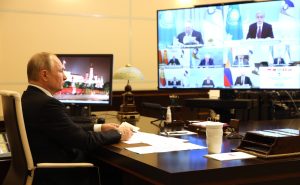In an October interview with the Russian newspaper Kommersant, Uzbek Foreign Minister Abdulaziz Kamilov answered a question on Uzbekistan’s reasons for delaying its joining the Eurasian Economic Union (EAEU). He said that the Uzbek government is taking time to study the risks it might endure from membership. Although he is not the first official to talk about potential negative implications of membership, many Uzbek officials clung to a vague approach of studying the “advantages and risks” before a final decision. Kamilov, however, made clear that the Uzbek government is not indifferent to discord within the organization.
Kamilov specifically said, “We are considering criticisms from the existing member countries… We want to study their dissatisfaction.” The criticisms under consideration are arguably economic, with little space to discuss the political implications of membership. Kamilov may also be signaling that Uzbekistan will request special exceptions to protect its economic interests and is working on identifying the areas it will want to negotiate on.
In the same interview Kamilov said that despite reservations, Uzbekistan has a strong desire to take advantage of the opportunities offered by the EAEU. He added that to prove its serious intentions, Tashkent has already started participating in the EAEU in the highest level. Indeed, Uzbek President Shavkat Mirziyoyev has attended two meetings of the Supreme Eurasian Economic Council since May 2020, when Uzbekistan’s lawmakers approved the country’s observer status.
Echoing some of the ongoing debate, in September Deputy Russian Minister of Foreign Affairs Andrey Rudenko had said, “We are not rushing Uzbekistan to make the final choice [on joining the EAEU]… When the country deems it necessary, it can join the organization. We believe that the EAEU truly presents great opportunities for economic development.”
The economic opportunities potentially offered by EAEU have been the most prominent issues in remarks delivered by officials whenever there is a talk about potential membership, leaving little space for consideration of potential issues and how to approach them. From Kamilov’s statement, however, it is clear that risks from EAEU membership are being discussed, but only at high levels. Those conversations have not trickled down to lower levels of government or the public.
That could explain why, among mid-level Uzbek politicians, the protracted membership process causes impatience. In October, the head of the Uzbekistan Liberal Democratic Party (OʻzLiDeP) Aktam Haitov, the party of Mirziyoyev, recently penned an article about his views of the EAEU, highlighting the potential benefits, a veritable mountain of gold.
According to the lawmaker’s argument, the EAEU is Uzbekistan’s path toward stable economic development and improving living standards via a single market for goods, services, capital, and labor resources. Haitov wrote that once the country becomes an EAEU member, Uzbekistan’s economy will become competitive on the global stage, which will lead to modernization. Furthermore, Haitov argued that currently Uzbek labor migrants are not allowed to work in the pharmaceutical industry and retail outlets in the EAEU, but once the country accedes to the organization, migrants will not only be able to work in those sectors, but also stay in Russia indefinitely under employment contracts.
In further defense of acceding to the EAEU, Haitov estimated that labor migrants from Uzbekistan would receive additional income of $3 billion per year as a result of abolishing the work permits currently necessary for Uzbeks to work in the countries of the EAEU. He did not clarify on what he was basing his calculations, but he most likely used Uzbekistan Prime Minister Abdulla Aripov’s estimates stated during a similar pro-EAEU argument in 2020 that every Uzbek migrant working in Russia paid about $1,000 a year for permits.
From Haitov’s point of view, improvements to the Uzbek economy will occur after the country joins the EAEU. In this view, the EAEU is a pathway to a better economy, a more competitive economy, and an economy that is able to compete in the global market by increased exports and better conditions for migrants.
Kamilov’s statement is not an indication that Tashkent has lost interest in the EAEU. It is another example of Tashkent’s preference for measured, rather than a radical, changes, including in the economic sphere. According to the EAEU’s estimates, in 2016-2019, the total trade between Uzbekistan and the member states doubled from $4.5 billion to $9.1 billion. That only creates a stronger incentive for Uzbekistan to seek membership. Tashkent seems to be taking time to identify areas and regulations it wants to request concessions over before it signs any final documents.

































